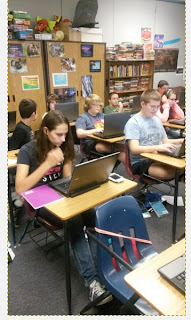One of the weakest areas identified on all grade levels' SOLs is summarizing, so we hit that skill hard this week. We worked together to identify the who, what, where, when, why/how of two news articles about the woman who brought an emotional support pig on board a plane the day before Thanksgiving. If the first attempt was incomplete, I returned it for a re-do. I next gave them a brief article in the Northern Virginia Daily about the repainting of the Mt. Jackson water tower, and they did a fabulous job summarizing it. For both assignments, I added an element of analysis by asking them to explain why the article was newsworthy at the end of the summary.Another weak area on the SOLs is identifying the main idea, so we had a lesson on identifying the topic, then figuring out the main idea from the topic.
I only had the computers one day this week--thank goodness! Because our Internet came under attack again, and it may not be resolved until the middle of next week. I was supposed to have the computers this upcoming Monday, but I'm not making another attempt until Wednesday. Cross your fingers!
We learned one new vocabulary word this week, qualm, and we took notes on direct and indirect characterization and began reading Truman Capote's "A Christmas Memory."
Encore did the main idea lesson, then began S. E. Hinton's That Was Then, This Is Now. ECO looked at exploring your passions, and we began with Jacob's wrestling and how to get into it as a career. On Friday, we began a self-appreciation list, which led to a lot of interesting discussion.
I am always looking for ways to better report student learning, which is why I volunteered to be on the superintendent's focus group on grading this year. In order to try to better report behaviors and grades, I created a weekly grade sheet to replace what I've been using; student feedback was overwhelmingly positive. I found the categories and descriptions from Ontario, Canada's, Ministry of Education; these categories are part of Ontario's report card. Of all the report cards I saw, I liked this one the best. Below, I've copied the categories and the rest of the sheet students had to complete on Thursday. You'll get a hard copy on Thursday when interims are sent out. I'm trying to get students to see how their behaviors impact their learning and therefore their grades.
Responsibility *Fulfills responsibilities and commitments within the learning environment *Completes and submits classwork homework, and assignments according to agreed upon deadlines *Takes responsibility for and manages own behavior
Collaboration *Accepts various roles and an equitable share of work and tasks *Responds positively to the ideas, opinions, values, and traditions of others *Builds healthy peer-to-peer relationships through personal and media-assisted interactions *Works with others to resolve conflicts and build consensus to achieve group goals *Shares information, resources, and expertise, and promotes critical thinking to solve problems and make decisions
Independent Work *Independently monitors, assesses, and revises plans to complete tasks and meet deadlines *Uses class time appropriately to complete tasks *Follows instructions with minimal supervision
Initiative *Looks for and acts on new ideas and opportunities for learning *Demonstrates the capacity for innovation and a willingness to take risks *Demonstrates curiosity and interest in learning *Approaches new attitudes with a positive attitude *Recognizes and advocates appropriately for the rights of self and others
Organization *Devises and follows a plan for completing work and tasks *Establishes priorities and manages time to complete tasks and achieve goals *Identifies, gathers, evaluates, and uses information, technology, and resources to complete tasks.
Self-Regulation *Sets own individual goals and monitors progress towards achieving them *Seeks clarification or assistance when needed *Assesses and reflects critically on own strengths, needs, and interests *Identifies learning opportunities, choices, and strategies to meet personal needs and achieve goals *Perseveres and makes an effort when responding to challenges
*If you aren’t reading at home at night, that would affect your score under Responsibility, Independent Work, Organization, and Self-Regulation. *If you talk excessively in class, that would affect your score under Responsibility, Independent Work, Collaboration and Self-Regulation. In which of these areas do you need to work the most next week? Why?



















